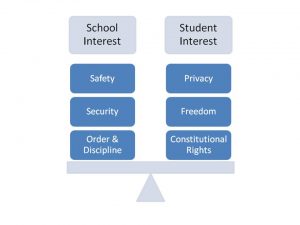In a unanimous opinion, the Ohio Supreme Court has held that a school’s search of an unattended bag, and the two subsequent searches that initiated from the initial search, were constitutional. The court held that the searches served a compelling governmental interest in protecting the safety of the students. Two lower courts had ruled that the subsequent searches were unconstitutional and thus suppressed the evidence found in those searches – including ammunition and a gun.
Whetstone High School student James Polk left a book bag on his school bus. The bus driver found the book bag and gave it to the safety and security resource coordinator, Robert Lindsey, who checks the buses to ensure that no students are remaining on board. Lindsey was not a police officer. Based on the high school’s practice of searching unattended book bags to identify the owner and to ensure the contents are not dangerous, Lindsey opened the bag and saw some papers and notebooks, along with Polk’s name written on one of the papers (search 1). He had heard that Polk was possibly in a gang, so he took the bag immediately to the principal’s office, where together they conducted a complete search of the book bag (search 2).
In conducting search 2, the principal and Lindsey found bullets in the book bag and then contacted a police officer. When the police officer arrived, they found Polk and searched him and the book bag he was carrying (search 3). They found a handgun in the book bag during search 3.
On trial for conveyance or possession of a deadly weapon or dangerous ordnance in a school-safety zone, Polk asked the court to suppress the evidence – both the bullets and the handgun – arguing that the searches were unconstitutional under the Fourth Amendment, which protects from unreasonable searches and seizures. Both the trial court and the court of appeals granted his motion to suppress the evidence, holding that search 1 – Lindsey’s initial opening of the bag enough to see Polk’s name on a document – was the only legitimate search. The other two searches, the courts held, were unconstitutional.
In general, under the Fourth Amendment, a police officer must have probable cause and a search warrant to conduct a search. However, courts have held that school searches may be conducted under a lesser standard of reasonable suspicion: justified at inception and reasonable in scope. In this case, the Ohio Supreme Court was tasked with determining whether the search protocol used was reasonable through balancing the government’s interest in safety and security against the student’s privacy interests.

The court centered on the constitutionality of search 2: whether it was permissible for the principal and Lindsey to conduct a full search of the student’s bag, when search 1 provided them with the identity of the owner of the unattended book bag.
In its finding, the court determined that it was appropriate for Whetstone High School to conduct complete searches of unattended book bags to ensure that they do not contain dangerous contents. Anything less than a complete search would not be enough to ensure safety and security for students. Key to this determination was that Whetstone High School required searches of unattended book bags to not only identify the owners but also to verify that the contents of the book bag are not dangerous. This was their protocol, albeit unwritten. Further, the search protocol was appropriate, reasonable, and reflective of the school’s obligation to keep students safe in a time when schools face a myriad of security concerns (e.g., school shootings, bomb threats, terrorist attacks). As a result, search 1 was inadequate in the court’s mind as it did not advance the school’s interest in ensuring safety and security of its students. Search 2 was required to fulfill this interest.
Additionally, the court found that the student’s expectation of privacy in his unattended book bag was “greatly diminished.” A person’s reasonable expectation of privacy diminishes when an item is lost or unattended, to the extent that the contents may be examined by the person who has found the item. Furthermore, a lost item in a closed container such as a book bag would carry an even lesser expectation of privacy, especially in a school setting, which must ensure the safety and security of all students.
Therefore, in balancing the school’s strong interest in protecting its students against Polk’s low expectation of privacy in the unattended book bag, the court determined that search 2 was reasonable and appropriate because the school needed to not only identify the owner of the book bag but also ensure the contents of the book bag were not dangerous. The court did not comment on search 3 but instead left the resulting judgment on that search to the lower court to make, consistent with this new decision.
State v. Polk, Slip Opinion No. 2017-Ohio-2735.
